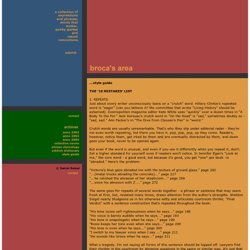

Training. Advices. Outils et logiciels. Concours. L’Oreille tendue. Articles. Everything You Need to Know About Writing Successfully in Ten Minutes, by Stephen King I.

The First Introduction THAT'S RIGHT. I know it sounds like an ad for some sleazy writers' school, but I really am going to tell you everything you need to pursue a successful and financially rewarding career writing fiction, and I really am going to do it in ten minutes, which is exactly how long it took me to learn. It will actually take you twenty minutes or so to read this essay, however, because I have to tell you a story, and then I have to write a second introduction. II. When I was a sophomore in high school, I did a sophomoric thing which got me in a pot of fairly hot water, as sophomoric didoes often do.
Eventually, a copy of this little newspaper found its way into the hands of a faculty member, and since I had been unwise enough to put my name on it (a fault, some critics argue, of which I have still not been entirely cured), I was brought into the office. I wasn't suspended. III. IV. S area. ...style guide 1.

REPEATS Just about every writer unconsciously leans on a "crutch" word. Hillary Clinton's repeated word is "eager" (can you believe it? The committee that wrote "Living History" should be ashamed). Cosmopolitan magazine editor Kate White uses "quickly" over a dozen times in "A Body To Die For. " Crutch words are usually unremarkable. But even if the word is unusual, and even if you use it differently when you repeat it, don't: Set a higher standard for yourself even if readers won't notice. "Victoria's blue gaze abraded me with the texture of ground glass. " page 202 "... The same goes for repeats of several words together - a phrase or sentence that may seem fresh at first, but, restated many times, draws attention from the author's strengths. What a tragedy. So if you are the author, don't wait for the agent or house or even editorial consultant to catch this stuff *for* you. 2.
Something is conveyed in this sentence, but who cares? 3. 4. 5. 6. Blog. Art of Writing - Write to Done. Want to capture an audience’s attention?

It’s more a matter of what you don’t do than you think. As children, when we learn to speak our language, we’re also learning to argue. Nearly everything our parents say to us is a correction, an explanation, or an argument for why we shouldn’t put that in our mouths, or why we should go to bed now and not in half an hour. It’s no surprise that we begin practicing the fine art of objecting, contradicting and basically giving our well-intentioned parents a damned hard time. We’re no sooner given an argument than we begin picking it apart to hand back our own argument. At first, kids aren’t so hot at this argument thing. How can you win, as a parent? To engage another person – from 3 to 102 in age – you have to stop arguing and start captivating. And as with most magic, this is both simpler and more difficult than you might imagine.
Interrupt the Pattern Magic is predicated on a simple idea: what you expect to happen doesn’t. They’re also captivated.